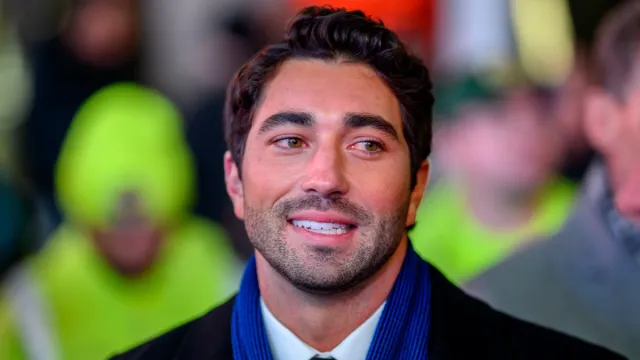“Bachelor” Joey Graziadei Shares Diagnosis Amid Concern About His “Yellow Eyes”

Over the past couple months, The Bachelor fans have fallen in love with Season 28 star Joey Graziadei. Both funny and charming, Graziadei also hasn’t shied away from talking about his insecurities and mental health troubles—topics that have only recently become less taboo on reality TV. Most recently, Graziadei got vulnerable on social media discussing a childhood diagnosis that sometimes causes the whites of his eyes to turn yellow, following a massive outreach from concerned viewers at home.
RELATED: Amy Schumer Shares Diagnosis Amid Concern About Her Changing Face.
In an Instagram video shared on Feb. 29, Graziadei assured Bachelor fans that he is healthy amid the rising concern around the discoloration of his scleras (the white protective layer of your eyes). Graziadei noted that he’s seen an influx of comments about his “yellow eyes,” which he said is a “harmless” symptom of a condition he’s been monitoring since he was a kid.
“I wanted to jump on here really quick and talk about something that I’m seeing a lot of comments about, which is ‘Joey’s yellow eyes,'” Graziadei says in the clip. “So, to give some context on that, I have to go all the way back to when I was in high school.”
Graziadei recalls that when he was a teenager, he got really sick. After “about a week and a half” of not feeling great, his mother made an appointment with a doctor just to make sure his illness wasn’t too serious or progressing into something worse. During his visit, the doctor ordered blood tests, which later led to an unforeseen diagnosis.
“The bloodwork showed that my bilirubin count was very high. That means that there could be something that was wrong with my liver,” Graziadei explains.
Bilirubin is the offshoot of broken-down old red blood cells, and is yellow by nature. In healthy bodies, bilirubin is processed in the liver, alongside other waste, and then travels through the intestinal tract before exiting your body, per the Cleveland Clinic. High levels of bilirubin often mean that your liver isn’t fully processing this waste.
The Bachelor star was advised to get a liver ultrasound. He also sought a second opinion from another set of doctors, who confirmed Graziadei didn’t have hepatitis, but did have a liver condition.
“They diagnosed me with something called Gilbert syndrome,” he reveals in his Instagram video.
Gilbert syndrome is “a common, harmless liver condition in which the liver doesn’t properly process bilirubin,” according to the Mayo Clinic. While the condition doesn’t require treatment, it is genetic.
“Gilbert syndrome is caused by a modified gene you inherit from your parents. This gene usually controls an enzyme that helps break down bilirubin in your liver,” the Mayo Clinic explains. “When you have an ineffective gene, your blood contains excess amounts of bilirubin because your body doesn’t produce enough of the enzyme.”
RELATED: Ex-Bachelor Host Chris Harrison Breaks Silence on Being Canceled: “I Was Being Used.”
In addition to “an occasional yellowish tinge of the skin and the whites of the eyes,” people can experience flare-ups when stressed or sleep-deprived, both of which are side effects of being reality TV, Graziadei acknowledges in his video.
That said, the reality star is well aware of his condition and its associated symptoms, and he wants everyone to know he’s doing perfectly fine.
“At the end of the day, I am told that I am healthy,” Joey reiterates. “It’s something that does affect the whites of my eyes, it makes it have those jaundice levels, which is why they look a little bit more yellow.”
As he ages, Graziadei says he will be paying closer attention to the condition. “I want to get my health right and make sure that I’m good,” he shares.
In the meantime, he’s grateful for all the concerned and warm messages.
“I do appreciate everyone looking out for me and wondering if I’m OK. But to my knowledge, I’m OK as I can be, and I’ll continue to look out,” Graziadei concludes.
- Source: Cleveland Clinic: Bilirubin Test
- Source: Mayo Clinic: Gilbert syndrome